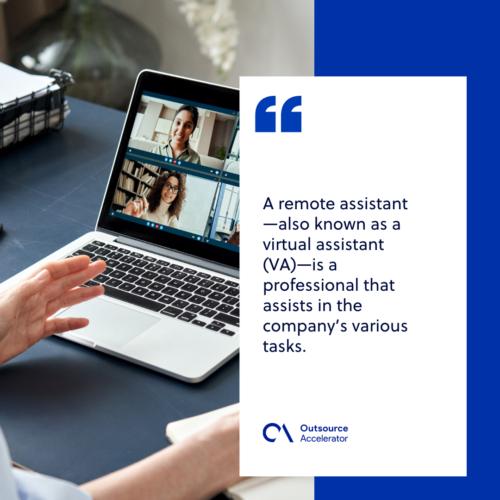Remote Professionals: Empowering Your Work-from-Anywhere Journey
Wiki Article
Exactly How to Construct an Effective Group of Remote Professionals
In today's significantly digital landscape, the ability to build an effective group of remote specialists is essential for organizations aiming to flourish. It is the subtler elements-- like nurturing a cohesive company culture and promoting continuous knowing-- that can really establish a remote group apart.Define Clear Objectives and Expectations
Frequently establishing clear goals and expectations is essential for the success of a remote team (Remote Professionals). Without these components, group participants might experience confusion regarding their roles, obligations, and the general goals of the project. This ambiguity can result in lowered productivity, misaligned efforts, and inevitably, task failingTo specify clear goals, it is vital to employ the SMART standards-- Certain, Measurable, Achievable, Pertinent, and Time-bound. This technique makes sure that each goal is well-defined and can be efficiently communicated to all group participants. It is essential to align specific goals with the overarching vision of the organization, cultivating a sense of objective and commitment amongst group members.

Foster Effective Interaction

Normal check-ins and team meetings can aid keep a strong interaction circulation, allowing participants to share development updates and discuss any obstacles they might experience. It is likewise vital to recognize that different people may have varying interaction designs. Understanding and fitting these distinctions can lead to more purposeful interactions and an extra cohesive group dynamic.
Encourage group participants to verbalize their ideas succinctly and to seek explanation when required. By prioritizing effective communication, remote groups can improve efficiency, strengthen relationships, and develop a much more inclusive work atmosphere, ultimately leading to greater success in accomplishing common objectives.

Utilize the Right Devices
To sustain effective interaction within a remote group, it is very important to make use of the right tools that facilitate collaboration and streamline workflows. The option of tools can dramatically affect performance, making certain that team participants remain connected and engaged regardless of geographical distances.Begin by carrying out task administration software program, such as Trello or Asana, to organize tasks, set due dates, and track development. This cultivates accountability and offers exposure right into each participant's payments. Furthermore, interaction systems like Slack or Microsoft Teams offer instant messaging abilities, allowing real-time conversations and fast decision-making.
Video conferencing tools, such as Zoom or Google Meet, are necessary for in person interactions, which aid construct relationship and strengthen relationships among employee. In addition, document sharing and storage services like Google Drive or Dropbox ensure that essential data are obtainable and editable by all staff member, promoting partnership on jobs.
Including these devices efficiently develops an atmosphere where remote professionals can prosper. By choosing the appropriate innovation, companies can enhance interaction, improve task monitoring, and eventually achieve their objectives much more efficiently.
Develop a Strong Firm Society
Developing a strong firm culture within a remote group is important for cultivating engagement and commitment amongst employees. A well-defined society provides a sense of belonging and shared objective, which is essential when group members are distributed throughout various places. To grow this society, leaders should develop clear values and expectations that reverberate with staff members, making sure that every person understands the objective and vision of the company.
Regular communication is essential in his response reinforcing this culture. Using video clip calls, team meetings, and casual check-ins can help promote and preserve links transparency. Additionally, celebrating accomplishments, both little and large, reinforces a culture of recognition and admiration.
Urging team collaboration through digital platforms not only enhances performance yet likewise cultivates social relationships - Remote Professionals. Organizing digital team-building activities can further strengthen bonds among team members, making them really feel more integrated right into the firm
Lastly, it is essential to listen to worker comments and adjust as needed. By showing that their voices matter, leaders can construct trust and commitment, inevitably producing a growing remote job atmosphere where workers feel valued and engaged.
Urge Continual Understanding and Growth
A solid business culture prepares for encouraging constant knowing and development within a remote team. By cultivating a setting that values growth, organizations can encourage workers to improve their skills, adjust to brand-new resource difficulties, and ultimately add better to team purposes.To advertise continuous learning, take into consideration carrying out regular training sessions, workshops, and webinars that align with both private job objectives and organizational demands. Utilize innovation to facilitate accessibility to e-learning platforms, making certain that resources are conveniently offered for remote employee.
Urge expertise sharing by developing mentorship programs and creating discussion forums for staff members to trade understandings and finest practices. Awarding and identifying group participants who proactively engage in discovering campaigns enhances the relevance of development and inspires others to adhere to fit.
Moreover, performing routine comments sessions can assist identify ability voids and areas for renovation, allowing for customized growth plans. By prioritizing continual learning and advancement, remote groups can grow a society of resilience, versatility, and advancement, which are essential for navigating the complexities of today's service landscape.
Final Thought
Finally, the facility of an effective remote group rests on the assimilation of clear goals, effective communication, appropriate tools, a robust company society, and continual learning opportunities. By aligning individual payments with business purposes and promoting a setting of visibility and cooperation, remote experts can prosper. Remote Professionals. The application of these techniques not only enhances team communication yet additionally drives inspiration, eventually causing enhanced performance and success in a remote working landscapeIt is the subtler aspects-- like from this source supporting a natural company society and advertising constant knowing-- that can really set a remote group apart.Effective interaction is the keystone of a thriving remote team. By focusing on reliable communication, remote groups can boost efficiency, strengthen partnerships, and produce a more comprehensive work environment, eventually leading to greater success in achieving typical objectives.
Producing a strong firm culture within a remote group is necessary for fostering involvement and commitment amongst workers.In conclusion, the facility of a successful remote group hinges on the assimilation of clear objectives, reliable interaction, appropriate devices, a robust business society, and constant understanding chances.
Report this wiki page